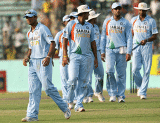
|

India must look to this man and his team to turn around the side's fortunes and not just the new coach
© AFP
|
|
India has become obsessed with the position of national cricket coach.
The country would be better served by thinking of a coach as a vehicle for moving large groups of people rather than a person who is going to transport the Indian team to the top of world cricket. If there is to be a renaissance in Indian cricket it will come via proud and spirited players, led by a strong captain.
There was no hand-wringing in Australia when John Buchanan moved on after the World Cup triumph. However, if Ricky Ponting was suddenly unable to captain Australia that would be cause for public concern.
Buchanan was in New Zealand when Australia lost the Chappell-Hadlee series three-nil and Ponting was resting. As soon as Ponting returned, albeit along with Adam Gilchrist and Michael Clarke, Australia played like demons to win the World Cup virtually unchallenged. A strong captain who is respected by his players can turn a team around but a coach can do very little sitting on the sidelines.
Ravi Shastri was on the right track when he said before the tour of Bangladesh: "The [Indian] players need to enjoy their cricket." A happy side is a winning team and they can't wait to get to the cricket ground and enjoy each others' company. When a team is losing and things are going wrong then each player starts to think about how he can best help his own cause. That is when they play as individuals and only strong leadership from the captain and senior players can change that status.
If the major cricket nations need a coach at international level then the system that is producing the players isn't doing its job. Players shouldn't need coaching at the top level; a bit of fine-tuning every now and again, especially mentally but not constant coaching. A captain needs a managerial type to 'run his errands' but not someone to plan the strategy or motivate the team; if the captain, in conjunction with his senior players and bowlers can't fathom out the opposition then the team is doomed.
A captain must run a cricket team because of the need to adapt tactically as the game unfolds and to be an on-field inspiration. If the captain needs to be told what to do from off the field then the team is in trouble and needs a new skipper. Inspiration can come in many forms with the obvious one being to play well but just as importantly, a captain needs to convey the message to his team that winning is the main objective.
 It won't be easy for Dravid with a team that has many senior players who are set in their ways and have had illustrious careers
It won't be easy for Dravid with a team that has many senior players who are set in their ways and have had illustrious careers
 |
Mark Taylor was a successful captain because he made it clear to his team and the opposition he was trying to win every game from ball one. Ponting turned his captaincy fortunes around when he had a no-holds barred meeting after the Ashes loss in 2005. By calling that meeting Ponting, who had had a very good series personally, made it clear to his team that his priority was the success of the team rather than any individual heroics.
Whether Rahul Dravid can turn India around over the next twelve months will depend on his grasp of those two aspects of leadership; the value of playing to win and honest appraisal within the team.
It won't be easy for Dravid with a team that has many senior players who are set in their ways and have had illustrious careers. It's also a difficult task because Dravid has had more than eighteen months to stamp his authority as a leader, so his style is already established and would be hard to alter dramatically.
Nevertheless, he has nothing to lose by becoming a more affirmative leader. Good results against England and then Australia would be a feather in his cap and would establish his captaincy legacy. Just as importantly, it would leave the next captain with an Indian side that was playing the game the 'right' way.
For too long now India has been a group of very talented individuals who rarely play as a unit. There were times when Sourav Ganguly, despite a hint of self-preservation in his own play, was able to get India performing as a team but eventually his magic wore off.
India should stop obsessing over the identity of the new coach. If he can assist Dravid build team spirit and player satisfaction then he will have done about all he can as a coach; the miracles will need to come from proud players who are inspired by their captain.

